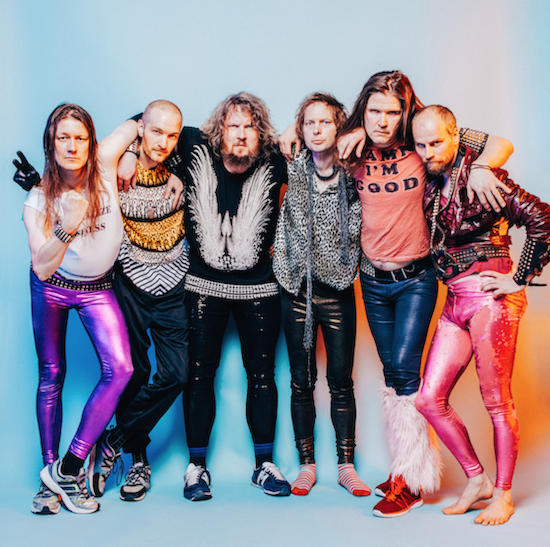Claiming to have little knowledge of what’s going on in the Finnish metal scene and citing no fellow bands within their own style, Circle are an outlier to say the least.
Deliberately existing outside of established genres, Circle can best be described as a satisfyingly mystic mix of heavy metal guitars, real and made-up languages, and forward-driving riffs.
Founded in Pori in 1992 by one of their three lead singers Jussi Lehtisalo, the band have seen many evolutions of band members and sounds, once defining themselves as New Wave Finnish Heavy Metal. Now, they seem to have outgrown even that definition, finding a new shape with in tracks from their upcoming album that are in a way more impassioned and rough around the edges than their over 30 records prior.
Above, you can listen to their latest record, Terminal, ahead of its release this Friday, and check out a chat with Lehtisalo about where the group headed after their now over 25-year career. While the band gets older, Lehtisalo loftily argues that the group instead bends “back towards eternal youth and immortality”.
The collective has already released 30+ albums, which is an impressive feat. Why make so much music? Do you have a fast work rate?
Jussi Lehtisalo: We are passionate and energetic musicians. We have minimised the amount of self-criticism. Fear of death, total impatience and an unconcerned attitude to weary notions of good and bad is what’s making us exceed speed limits. We’re hijacking the holy inspiration from otherness, and we don’t spoil it with personal aesthetic preferences. We are panthers and gazelles, not slugs and tortoises. Though it must be said that after turning forty I’ve started to resemble a sloth more and more.
You’ve described your music as a mix of many different genres, how would you describe Terminal? Who would you define as your peers in such experimental music?
JL: I try not to define my own music. I think we are the only ones in the genre that’s of our own creation. As music, Terminal is a fascinating reconstruction of lives lived by forty-year-olds. It has a taste of breakthrough and a sense quiet insignificance, a balance of new beginning and end of everything. As for our peers, I would say Acid Mothers Temple.
Explain to us in the UK what the metal scene is like in Finland right now as opposed to other surrounding countries, for example. Is the genre of New Wave Finnish Heavy Metal, as you have previously identified as, in good health?
JL: Unfortunately I hardly follow the Finnish metal scene at all at the moment. I’m more interested in traditional ’80s heavy metal, and I’m still a little scared of black metal and death metal and their provocative imagery. I would assume that in Finnish metal advertising agencies are used less than for instance in Sweden, and it’s easier for bands to dress up in bear fur. New Wave of Finnish Heavy Metal is taking its last breaths. Steel Mammoth is the only band still active in the genre with their album Atomic Oblivion that’s coming out soon. At the moment, the hottest new genre in my opinion is New Wave of Happy Heavy Metal, which is represented at least by bands like Aktor and Iron Magazine. The genre definition would partly include the great band Rivette as well!
How did you come to create your own language Meronia, and is it just a collection of sounds or does it have a full set of meanings?
JL: Meronian language just started to pour out of me in the early ’90s. ‘Understanding’ Meronian is a psychic process which succeeds when we break through the boundaries of comprehension and reach for what’s beyond our limited perception. Its ambiguousness is related to the ambiguousness of music, and it doesn’t guide us too much towards semantic domains. It contains all the necessary meaning required in our rock music.
Given that you make use of an invented language, are lyrics important in your music as a collective, or not at all? Do you think using an experimental language has changed how your music has been received?
JL: There are three lead vocalists in Circle. I sing only in Meronian but there are also elements of English and Finnish languages in our songs. When we use the spiritual Meronian language, the word ‘international’ doesn’t do justice to our band. This kind of psychic language’s means of communication can reach galaxies beyond our planet, not to mention the other living and inanimate entities of our own planet.
Is the music mostly pre-written, or is it a product of improvisation? Is there a pre-set mood or theme you are trying to convey?
JL: Terminal was pre-written, but many of the previous albums have been conceived in the studio by improvising. We make records with such gusto that we don’t have enough time together for practicing. As we live in different cities, we get to see each other much less. The group is enthusiastic about making art, but it’s also a good excuse to get together with friends and to enjoy each other’s company and to catch up on what’s going on with us. Our attitude to making music is carefree and we don’t stress about it at all. If music or a particular feeling doesn’t come out willingly, we’ll force it out.
What sets this current group apart from when you were just starting out in the early ’90s?
JL: We are geriatric, and I’ve got one foot in the grave. But when I start to think about it in the quiet of the night, I’m filled with energy and I think that time does not proceed chronologically for us after all. Instead, we are bend back towards eternal youth and immortality.
Terminal will be released on June 23 via Southern Lord


